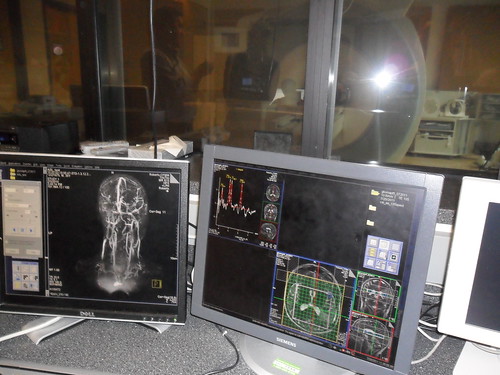This is John Preece guestblogging about a recent trip to the University of Western Ontario for the official opening of the Centre for Brain and Mind (see also Lara Kaute’s post from July 29th). The Centre boasts some 20 principal investigators, including Dr. Adrian Owen (Canada Excellence Research Chair in Cognitive Neuroscience and Imaging and formerly of the University of Cambridge), and a world-leading 7 Tesla MRI facility dedicated to neuroscience.
We arrived at the leafy Western campus to a packed meeting room and a jovial atmosphere. After a short and inspiring round of speeches (many highlighting the suprisingly high cost of the magnets used in the MRI scanners), we were assigned a postdoc guide and given free run of the Centre’s facilities. Most of the hand-on experiments were desigend to isolate specific behavioural effects, which can then be studied using EEG or fMRI techniques. One of my favourites was a set-up where you had to try and pick out a kind-of-famous person next to a picture of a similar-looking person, in order for the researchers to gain insight into disorders like Capgras syndrome.
The highlight of the visit was a tour of the MRI facility, which consists of two state-of-the-art scanners and an expert staff. A 3 T MRI scanner, considered pretty high-end by hospital standards (about half of hospital MRIs are 3 T; the other half are 1.5 T), is used for general neuroscience and diagnostics, and generated the images that you can see in this post. The Centre’s show-off piece is a 7 T MRI scanner dedicated to brain imaging, the only one in Canada and one of only a few tens worldwide (only two others of which are used exclusively for neuroscience). The intense magnetic field, operating at the very limits of the superconducting niobium alloys used, is about 1400 times stronger than a fridge magnet and allows unprecedented speed and resolution.
In addition to the unveiling of the new equipment, the official opening was used to announce an international exchange programme for postdoctoral researchers between the University of Western Ontario, the University of Cambridge, King’s College London and University College London. Watch this blog for more information on how SIN Canada will be involved in this fruitful Canada-UK partnership.

